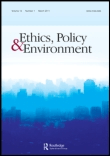
Ethics Policy & Environment
Scope & Guideline
Illuminating Ethical Pathways in Environmental Governance
Introduction
Aims and Scopes
- Environmental Ethics:
The journal explores ethical considerations related to environmental issues, including the moral implications of human interactions with nature, animal rights, and biodiversity. - Climate Justice:
A significant focus is placed on justice in the context of climate change, examining the responsibilities of individuals, communities, and nations in addressing climate harms and equitable resource distribution. - Sustainability and Governance:
The publications often discuss sustainable practices and governance frameworks, advocating for ethical decision-making in environmental policy and management. - Community Engagement and Participatory Approaches:
The journal emphasizes participatory methods in ethical assessments and environmental decision-making, aiming to include diverse stakeholder perspectives in discussions. - Interdisciplinary Perspectives:
It encourages interdisciplinary approaches, integrating insights from philosophy, social sciences, and environmental studies to address complex ethical dilemmas.
Trending and Emerging
- Relational and Community Ethics:
Emerging discussions emphasize the importance of relational values and community ethics, highlighting how connections between humans and nature shape ethical considerations in environmental policy. - Hope and Agency in Environmental Action:
There is a growing emphasis on hope as a motivational force in environmental ethics, exploring how optimism and agency can drive effective climate action and resilience. - Justice and Injustice in Climate Policy:
Recent themes increasingly address structural injustices and ethical responsibilities in climate governance, examining how policies can perpetuate inequities among marginalized communities. - Innovative Approaches to Climate Change:
The journal is trending towards innovative ethical frameworks, such as exploring synthetic biology and geoengineering, and their implications for conservation and environmental ethics. - Ecological and Environmental Resilience:
A notable shift towards discussing ecological resilience and sustainability reflects a growing recognition of the need for adaptive strategies in the face of environmental change.
Declining or Waning
- Traditional Conservation Ethics:
There appears to be a waning interest in conventional conservation ethics, as newer discussions shift towards more complex and integrative approaches that consider socio-political dimensions. - Anthropocentrism in Environmental Ethics:
The focus on strictly anthropocentric approaches to environmental ethics is declining, with a noticeable shift towards non-anthropocentric frameworks that prioritize ecological integrity and animal rights. - Historical Emissions Accounting:
Discussions specifically centered around historical emissions and consumption-based accounting are becoming less prevalent, as the journal pivots towards broader ethical implications and justice frameworks. - Reductionist Views on Environmental Issues:
The journal is moving away from reductionist perspectives that simplify environmental issues, favoring instead nuanced discussions that incorporate systemic and relational understandings.
Similar Journals
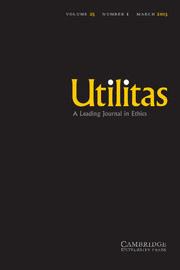
Utilitas
Illuminating contemporary debates in social sciences.Utilitas, published by CAMBRIDGE UNIVERSITY PRESS, is a prominent journal in the fields of Philosophy and Social Sciences, specifically Sociology and Political Science. Established in 1989, this esteemed journal has developed a reputation for its rigorous peer-reviewed articles that explore significant philosophical theories and their implications in societal contexts. With an impressive impact factor and consistently ranking in the Q1 category for Philosophy and Q2 for Sociology and Political Science, Utilitas serves as a vital platform for scholars to disseminate innovative research and engage with contemporary debates. The journal provides a comprehensive range of studies, emphasizing critical approaches to utilitarianism and ethical considerations in modern society. Researchers, professionals, and students alike will find Utilitas an invaluable resource, fostering an environment of intellectual growth and discourse in the ever-evolving landscape of philosophy and social science.
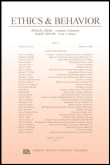
ETHICS & BEHAVIOR
Unraveling the Threads of Morality and Human ConductETHICS & BEHAVIOR is a leading academic journal published by Routledge Journals, Taylor & Francis Ltd that has been at the forefront of ethical and behavioral research since its inception in 1991. With an ISSN of 1050-8422 and an E-ISSN of 1532-7019, the journal is committed to exploring the complex interactions between morality, ethics, and human behavior in various social contexts. Recognized for its significant contribution to the field, ETHICS & BEHAVIOR holds a notable Q2 ranking in both general psychology and social psychology categories, with impressive Scopus rankings reflecting its academic impact and relevance. Although the journal is not open access, it remains an indispensable resource for researchers, professionals, and students seeking to understand the ethical dimensions of human behavior. Covering diverse topics from applied ethics to behavioral studies, ETHICS & BEHAVIOR serves as a platform for innovative ideas and rigorous empirical research, shaping the discourse in psychology and social sciences. Address: 2-4 Park Square, Milton Park, Abingdon OX14 4RN, Oxon, England.

Journal of Academic Ethics
Navigating the Complexities of Academic EthicsThe Journal of Academic Ethics, published by Springer, is a premier scholarly outlet dedicated to the exploration and analysis of ethical considerations across various disciplines, including philosophy, education, sociology, and the broader arts and humanities. With an ISSN of 1570-1727 and E-ISSN of 1572-8544, this journal has established itself as a vital resource since its inception in 2005, continuing to provide insightful contributions through 2024. Recognized for its impactful research, it holds esteemed positions in multiple Scopus categories, including a Q1 ranking in both Arts and Humanities (Philosophy) and a Q2 ranking in Education and Sociology. This highlights the journal's significance in fostering ethical discourse among researchers and practitioners alike. Although it does not currently offer open access, the journal's robust academic framework ensures high-quality contributions that advance knowledge and promote critical discussions about ethical practices in academia and beyond. For anyone engaged in ethical inquiries, the Journal of Academic Ethics serves as an indispensable platform for innovative research and scholarly dialogue.
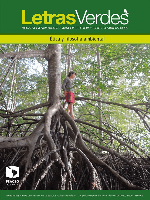
Letras Verdes
Advancing Conversations in Environmental HumanitiesLetras Verdes, published by the FAC Latinoamericana Ciencias Sociales (FLACSO) in Ecuador, is a distinguished academic journal that focuses on environmental humanities and literature's intersection with ecological issues. With an ISSN of 1390-6631 and an E-ISSN of 1390-6631, this Open Access journal has been disseminating knowledge since 2008, encouraging wide accessibility to research findings. Although currently without an H-Index, Letras Verdes plays a vital role in promoting interdisciplinary dialogue among scholars, professionals, and students interested in sustainability, environmental ethics, and cultural studies. Its commitment to open access not only enhances visibility but also fosters a global exchange of ideas, making it an essential platform for those seeking to explore the complex narratives surrounding environmental challenges.

ENVIRONMENTAL VALUES
Navigating the Intersection of Nature and ValuesENVIRONMENTAL VALUES is a distinguished journal dedicated to exploring the intricate intersections of environmental studies and philosophical discourse. Published by SAGE Publications Inc, this journal has made a significant mark within its fields, featuring a robust impact factor and making it an esteemed Q2 journal in Environmental Science and a prominent Q1 journal in Philosophy as of 2023. With an ISSN of 0963-2719 and an E-ISSN of 1752-7015, ENVIRONMENTAL VALUES provides a scholarly platform for rigorous research, theoretical exploration, and critical dialogue that spans across disciplines, thereby compellingly addressing the ethical dimensions of environmental issues. Its impressive Scopus rankings place it within the top percentile of both the Philosophy and General Environmental Science categories, underlining its relevance and influence. Researchers, professionals, and students are encouraged to engage with the journal to contribute to and learn from cutting-edge discussions that shape our understanding of environmental ethics and values as we move towards 2024 and beyond.
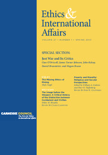
Ethics & International Affairs
Fostering Dialogue on Ethical Challenges WorldwideEthics & International Affairs is a leading peer-reviewed journal published by Cambridge University Press, offering critical insights at the intersection of ethics, philosophy, and international relations. Established in 1987 and reflecting a robust commitment to interdisciplinary scholarship, the journal aims to foster dialogue on pressing ethical issues in global affairs, addressing topics from military intervention to humanitarian aid. With an impressive Scopus ranking that places it in the 85th percentile for Philosophy and the 64th percentile for Political Science and International Relations, Ethics & International Affairs has established itself as a cornerstone publication within academic circles. Although the journal is not Open Access, it remains accessible through academic institutions and libraries. The journal provides a platform for researchers, professionals, and students alike to contribute to and engage with the evolving discourse on ethical challenges in international contexts, making it an essential resource for anyone looking to deepen their understanding of the moral dimensions of global politics.

Journal of Practical Ethics
Empowering Ethical Engagement in SocietyJournal of Practical Ethics is an esteemed open-access journal published by the Oxford Uehiro Centre for Practical Ethics, dedicated to enhancing the discourse surrounding ethical issues in various fields, including healthcare, technology, and social policy. Since its inception in 2013, the journal has fostered a robust academic platform for researchers, professionals, and students to explore and publish innovative ideas and solutions to real-world ethical dilemmas. The journal's commitment to making research freely accessible emphasizes its role in bridging the gap between academic inquiry and practical application, thereby encouraging a broader engagement with ethical considerations across disciplines. As the importance of ethical frameworks continues to grow in an increasingly complex world, the Journal of Practical Ethics stands as a vital resource for those seeking to influence policy and practice through rigorous ethical analysis.
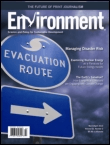
ENVIRONMENT
Driving Change Through Cutting-Edge Environmental ResearchENVIRONMENT is a premier journal published by Routledge Journals, Taylor & Francis Ltd, focusing on interdisciplinary studies in the field of environmental science. With the ISSN 0013-9157 and E-ISSN 1939-9154, this journal serves as a vital platform for the dissemination of high-quality research and innovative ideas that address contemporary environmental challenges. Spanning over five decades since its inception in 1969, the journal boasts an impressive impact factor and is recognized in multiple prestigious categories: Q1 in Environmental Engineering and Water Science and Technology, as well as Q2 rankings in Global and Planetary Change and Renewable Energy, Sustainability, and the Environment. Covering a diverse scope from ecological studies to sustainable technologies, it attracts a global readership comprised of researchers, professionals, and students committed to driving progress in environmental sustainability. Although currently not an open-access journal, it offers essential insights and empirical findings crucial for policy development and practical applications in the world of environmental science. The journal not only contributes to scholarly discourse but also plays a significant role in shaping future research directions and fostering a deeper understanding of the intricate relationships between humans and their environment.
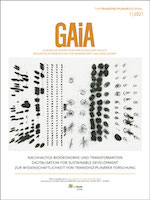
GAIA-Ecological Perspectives for Science and Society
Exploring the Nexus of Ecology, Economy, and SocietyGAIA - Ecological Perspectives for Science and Society, published by OEKOM VERLAG GMBH in Germany, serves as a vital interdisciplinary platform for researchers and practitioners at the intersection of ecological science, economics, and societal impacts. With an ISSN of 0940-5550 and E-ISSN of 2625-5413, this journal has made a significant contribution to the field since its inception in 2005 and continues to foster scholarly dialogue through its convergence into 2024. GAIA is recognized in the Q2 category in Economics, Econometrics and Finance (miscellaneous) and the Q3 category in Environmental Science (miscellaneous), emphasizing its relevance and impact within the academic community. With Scopus rankings that place it within the top percentiles for multiple disciplines, GAIA not only enhances the understanding of ecological and environmental issues but also influences policy and practices that aim to promote sustainable societal development. Researchers, professionals, and students are invited to engage with the journal's cutting-edge articles, which are available through various access options, ensuring that ecological perspectives are accessible to all.
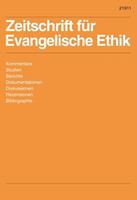
ZEITSCHRIFT FUR EVANGELISCHE ETHIK
Contributing to the Landscape of Religious EthicsZEITSCHRIFT FUR EVANGELISCHE ETHIK, published by WALTER DE GRUYTER GMBH, is a leading journal in the field of Religious Studies, noted for its critical examination of evangelical ethics and theological perspectives. With an ISSN of 0044-2674 and E-ISSN of 2197-912X, this journal serves as a pivotal platform for scholars seeking to explore contemporary issues through a rigorous ethical lens. Based in Germany, it engages readers with a rich tapestry of interdisciplinary insights, contributing significantly to ongoing discussions within the realm of religious ethics. The journal enjoys a commendable position in the Scopus rankings, placed in the Q3 quartile and ranking #476 out of 644 in its category, reflecting its dedication to quality scholarship. Spanning over two decades, with converged years from 2002 to 2024, it fosters valuable dialogues between researchers, professionals, and students alike. Although not Open Access, the journal's subscription options ensure accessibility to essential scholarly works that can impact both academic and practical applications in religious thought.